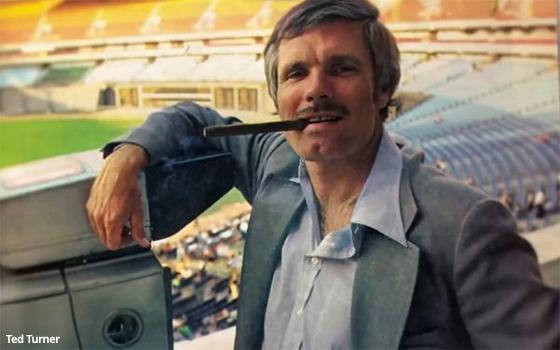
To those of us old enough to remember,
“Ted” is not a talking teddy bear.
We all know the real “Ted” is Ted Turner, 85, whose life and career get a thorough going-over in
“Call Me Ted,” a six-part documentary series that started streaming Wednesday on Max.
Max, of course, is a unit of Warner Bros. Discovery, the sprawling media
behemoth whose many parts include CNN plus cable networks with “Turner” in their original names -- TNT (Turner Network Television), TBS (Turner Broadcasting System) and Turner Classic
Movies (TCM).
Ted Turner’s role in the history of WBD is undeniable, but it can also be said (at least by me) that the TV business as we know it today might
not even exist in its present form if it wasn’t for Turner and his brash, sometimes reckless risk-taking.
advertisement
advertisement
In the pantheon of media giants, Turner was a
magnetic, charismatic, one-man energy field who zigged when everyone else zagged.
They all laughed when he proposed to build a 24-hour news channel on cable. They told Turner
he would never be an earner when he bought a couple of down-at-the-heels, southern TV stations that nobody watched and hustled them into profitability. Who’s got the last laugh now?
Many already know that Turner changed television, pioneered basic cable and was the visionary behind the creation of CNN. He was a victorious yachtsman, lady-killer and
baseball team owner (the Atlanta Braves) too.
In the 1980s and beyond, Turner was arguably the best-known celebrity in America. He was certainly the
best-known billionaire media figure.
It has been said that at one time, Turner was the largest private landowner in the United States with around 2 million
acres. Google says he was eventually surpassed by another cable legend, John Malone.
Malone just happens to be an executive producer of “Call Me
Ted” along with another cable mogul, Comcast chairman and CEO Brian Roberts. The series is produced by Joni Levin and written and directed by Keith Clarke.
Much of
Turner’s life has been an open book, mainly because one of his most endearing qualities over the years has been his self-deprecating willingness to speak openly about himself.
Aspects of his story are greatly illuminated in “Call Me Ted,” including his very complicated relationship with his father, who shot himself to death in a
bathtub when Turner was 24.
Among the more fascinating stories, the doc reveals that one of Turner’s biggest influences was the movie “Citizen
Kane.”
The famed 1941 movie directed by and starring Orson Welles was about a fictional newspaper
mogul named Charles Foster Kane.
When Turner saw the movie on television sometime in his 20s, he was flabbergasted by the parallels with his own
life.
Like Kane, Turner was thrown out of college (Brown University) and had an abusive father. In “Citizen Kane,” a story is even told about a
father who shot himself.
In the movie, Kane set out to create a coast-to-coast newspaper empire. When others advised against it, he did it anyway. In many
ways, that was the Turner way too.